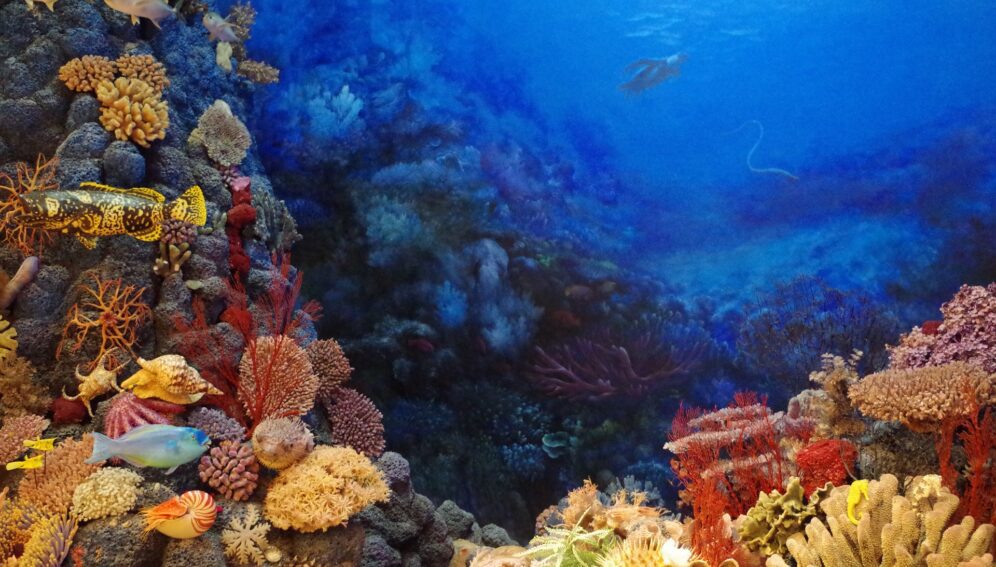03/02/22
Meeting climate goals won’t save corals — study

By: Claudia Caruana
Send to a friend
The details you provide on this page will not be used to send unsolicited email, and will not be sold to a 3rd party. See privacy policy.
[NEW YORK] A rise in global warming by two degrees Celsius could result in the loss of cool areas in the sea called thermal refugia that can protect coral reefs from increasing temperatures, says a study.
In some areas, local ocean dynamics such as upwelling and strong currents were thought to buffer the effects of warming seas. But the researchers say these thermal refugia could decline as seas warm.
Coral reefs support much of marine biodiversity and about a billion people rely on them for their livelihoods and food security, says Adele Dixon, a researcher at the Priestley International Centre for Climate at the University of Leeds and lead author of the study, published this month in PLOS Climate. The study puts the value of goods and services from coral reefs at US$2.7 trillion per year.
“As we lack the resources to protect coral reefs everywhere, we need to decide which reef areas to protect. Our team decided to identify areas least exposed to future climate change and which reefs have the greatest chance of survival,” she says.
Dixon and the research team found that about 85 per cent of the world’s coral reefs lie in thermal refugia, but predict a drop to less than one per cent, if temperatures rise 1.5 degrees Celsius above pre-industrial levels. While small areas of thermal refugia may remain, particularly in the East Indian Ocean Sumatra-Java region, the likelihood of a catastrophic total loss of coral reefs was high if temperatures rise by two degrees Celsius, Dixon says.
“Our research reinforces the stark reality that there is no safe limit of global warming for coral reefs. Following the COP26 [climate summit] in Glasgow, in which some progress was made towards the 1.5 degrees Celsius target, our finding shows that 1.5 degrees Celsius is still a substantial amount of warming for ecosystems on the frontline of climate change,” Dixon says.
She adds that the analysis highlights different effects in different regions. “At 1.5 degrees Celsius of warming, thermal refugia will disappear from all but 12 regions worldwide: Polynesia and the Coral Triangle in the western Pacific Ocean. Refugia will be lost from regions such as Oman, the Caribbean, Colombia, and Indonesia.”
“At 1.5 degrees Celsius of warming, thermal refugia will disappear from all but 12 regions worldwide: Polynesia and the Coral Triangle in the western Pacific Ocean. Refugia will be lost from regions such as Oman, the Caribbean, Colombia, and Indonesia.”
Adele Dixon, Priestley International Centre for Climate, University of Leeds
Co-author and researcher with the Physics and Marine Geophysical Laboratory in the College of Science and Engineering, James Cook University, Australia, Scott Heron says: “Identifying refugia locations related to the greatest threat (heat stress causing coral bleaching and mortality) helps to locate priority areas for management.”
Heron believes that given the rate at which ecological impacts on corals has increased and is projected to accelerate, and the number of people reliant upon coral reefs, “it is important to understand where climate change disturbances will occur. The broad scale of impacts points to the urgent need for significant action on the causes of climate change”.
Oceanographer Mark Eakin says: “This study provides further support for the threat the climate crisis poses to coral reefs around the world. While numerous reefs have been safe from frequent, severe bleaching in the past, this study shows that at even the most optimistic Paris Agreement level of global warming very few of the world’s reefs will be spared.”
Tim McClanahan, a senior conservationist with the Wildlife Conservation Society specialising in coral reef conservations, based in Mombasa, Kenya, tells SciDev.Net that the research shows there will be few reefs that experience low chronic stress in the future.
“Chronic stress will become widespread, and corals will have to resist or adapt to chronic stress to survive. Future sanctuaries from chronic stress will, therefore, be less common,” says McClanahan.
He believes sanctuaries that are resistant to or recover from chronic stress will still be present. There will be coral reef sanctuaries but fewer that avoid chronic heat exposure. “Therefore, there is a need to evaluate where resistant and recovery sanctuaries are located to reduce the number of additional threats that these reefs experience, such as fishing and pollution,” he adds.
One issue not well covered in the research, McClanahan says, is the large differences in the sensitivity of corals to thermal stress. “Coral in the Coral Triangle, for example, have lower sensitivity to stress than those in the Indian Ocean and Caribbean… Some reefs are frequently exposed to stress and the corals there are adapted whereas others are not and, therefore, not adapted.”
This piece was produced by SciDev.Net’s Asia & Pacific desk.















